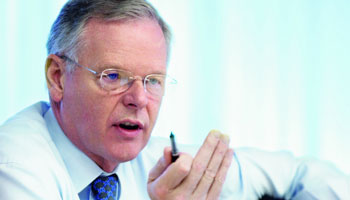 Healthcare reported a 1% comparable sales decline, as strong double-digit growth in emerging markets practically offset the decline in a still soft US market. Growth was strongest at Home Healthcare Solutions, with the successful introduction of the new "Philips Respironics System One". This, together with growth at Customer Services, almost offset declines at Imaging Systems and Healthcare Informatics.
Healthcare reported a 1% comparable sales decline, as strong double-digit growth in emerging markets practically offset the decline in a still soft US market. Growth was strongest at Home Healthcare Solutions, with the successful introduction of the new "Philips Respironics System One". This, together with growth at Customer Services, almost offset declines at Imaging Systems and Healthcare Informatics.
Business highlights
- Philips secured a multi-million dollar imaging systems order from Palomar West, a 360-bed facility is part of the Palomar Pomerado Health System in San Diego, California.
- Philips has signed a memorandum of understanding with the Suzhou Municipal Government to establish an industrial campus for Imaging Systems in China. To be developed over the next five years for an investment of EUR 36 million, the Philips campus will have integrated facilities for R&D, manufacturing, assembly and sourcing in one site and will further enhance the company's presence in China.
- Philips introduced economy/mid-range patient monitoring solutions to the India market. This marks a significant milestone in growing Philips' value-based offerings following the 2008 acquisition of Shenzhen Goldway Industrial, Inc. in China.
- Philips signed a five-year agreement with Dutch insurer Achmea Health to cooperate in the development of innovative care solutions aimed at enabling chronic disease sufferers to better manage their health at home, reducing the need for hospital stays.
Financial performance
- Currency-comparable equipment order intake increased 7% year-on-year, with improvements across all businesses. Higher orders at Imaging Systems, Clinical Care Systems and Healthcare Informatics were driven by strong intake in international markets. North American market declines were less severe than in prior quarters.
Gerard Kleisterlee, President and CEO of Royal Philips Electronics, concluded: "Thanks to the increased resilience of our company, we ended the year with a strong fourth quarter. Comparable sales came in at last year's level, delivering a record adjusted profitability of 12.3%. This reflects our strengthened fundamentals and the successful manner in which we have been managing through the downturn.
I am particularly pleased as our improved performance is visible across all three operating sectors:
- Despite continuing weakness in the US market, our Healthcare sector managed to deliver another bumper quarter with sales broadly on par with the strong performance of last year and with significantly higher earnings;
- Our Consumer Lifestyle sector managed to show sales growth, with Television turning a profit and virtually all other businesses posting significantly higher earnings despite the absence of a material recovery in consumer confidence;
- The Lighting sector continued on its road to recovery with strongly improved earnings and rebounding sales even though the commercial construction market continued to be in decline; and for the first time, LED-based products exceeded 10% of total sector sales.
Philips today is a simpler company that is both agile and more resilient to market fluctuations. We faced the economic recession in 2009 head-on, but without sacrificing our longer-term ambitions: we sustained our investments in marketing and innovation, while continuing with responsible acquisitions to fill gaps in our portfolio, such as with Saeco, establishing ourselves as a leader in the high-growth, high-margin espresso machine market.
While today's economic circumstances do not allow for a reliable prediction of future developments, I am confident that based on our Q4 performance, the strength of our portfolio of globally leading businesses and our engaged workforce, 2010 will be a year of further progress towards becoming the leading company in Health & Well-being. And as a sign of our confidence in our future, we propose to maintain, despite the high pay-out ratio, our dividend at EUR 0.70 a share, on par with last year; with an eye on maintaining our financial prudence, we will offer our shareholders a choice of cash or stock."
Related news articles:
- Philips Healthcare's Profile
About Royal Philips Electronics
Royal Philips Electronics of the Netherlands (NYSE: PHG, AEX: PHI) is a diversified Health and Well-being company, focused on improving people’s lives through timely innovations. As a world leader in healthcare, lifestyle and lighting, Philips integrates technologies and design into people-centric solutions, based on fundamental customer insights and the brand promise of "sense and simplicity". Headquartered in the Netherlands, Philips employs approximately 116,000 employees in more than 60 countries worldwide. With sales of EUR 23 billion in 2009, the company is a market leader in cardiac care, acute care and home healthcare, energy efficient lighting solutions and new lighting applications, as well as lifestyle products for personal well-being and pleasure with strong leadership positions in flat TV, male shaving and grooming, portable entertainment and oral healthcare. News from Philips is located at www.philips.com/newscenter.